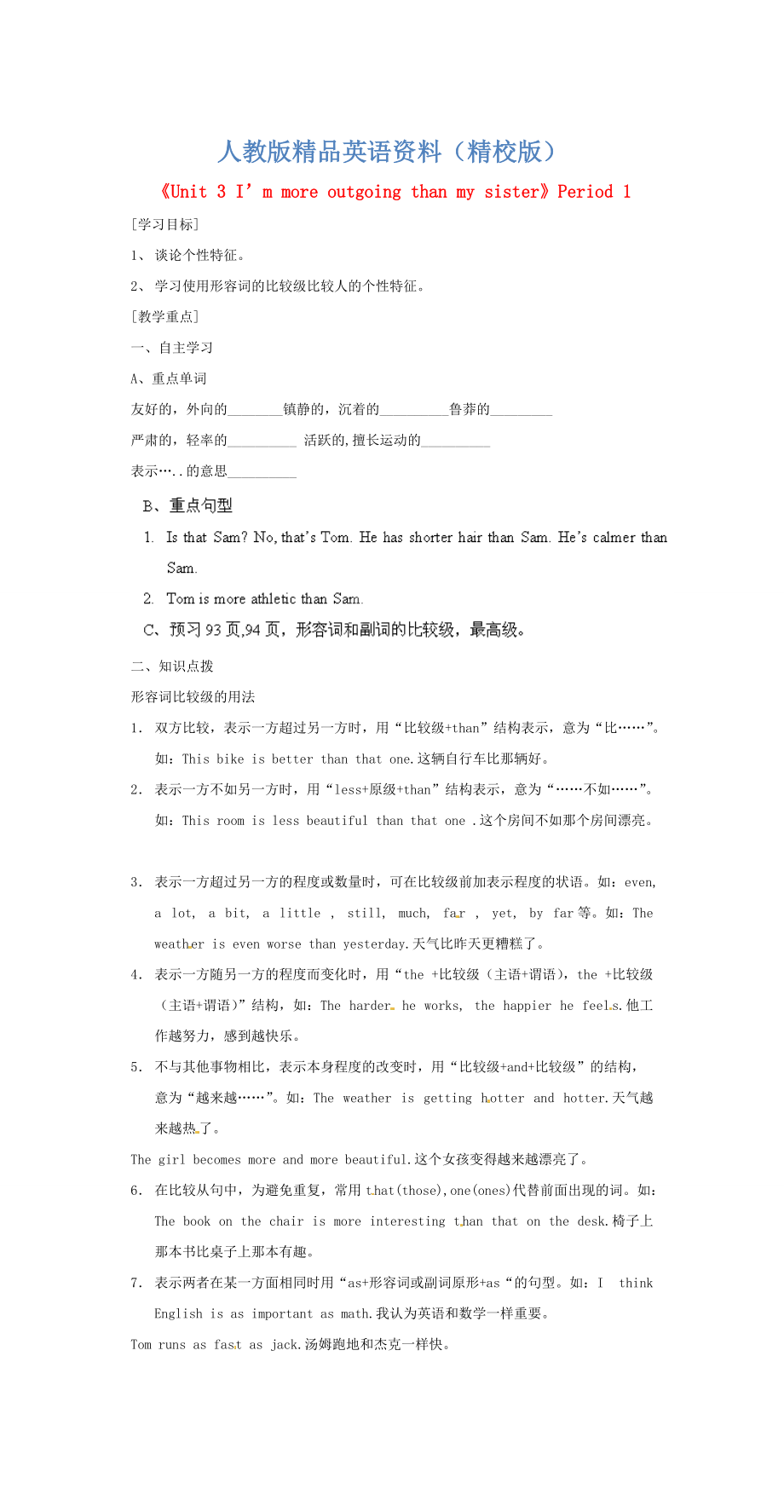《【精校版】人教版八年級(jí)英語(yǔ)上冊(cè)Unit 3 Period 1導(dǎo)學(xué)案》由會(huì)員分享���,可在線閱讀,更多相關(guān)《【精校版】人教版八年級(jí)英語(yǔ)上冊(cè)Unit 3 Period 1導(dǎo)學(xué)案(2頁(yè)珍藏版)》請(qǐng)?jiān)谘b配圖網(wǎng)上搜索���。
1、人教版精品英語(yǔ)資料(精校版)
《Unit 3 I’m more outgoing than my sister》Period 1
[學(xué)習(xí)目標(biāo)]
1���、 談?wù)搨€(gè)性特征���。
2���、 學(xué)習(xí)使用形容詞的比較級(jí)比較人的個(gè)性特征。
[教學(xué)重點(diǎn)]
一���、自主學(xué)習(xí)
A���、重點(diǎn)單詞
友好的,外向的________鎮(zhèn)靜的���,沉著的__________魯莽的_________
嚴(yán)肅的���,輕率的__________ 活躍的,擅長(zhǎng)運(yùn)動(dòng)的__________
表示…..的意思__________
二、知識(shí)點(diǎn)撥
形容詞比較級(jí)的用法
1. 雙方比較���,表示一方超過(guò)另一方時(shí)���,用“比較級(jí)+than”結(jié)構(gòu)表示,意為“比…
2���、…”���。如:This bike is better than that one.這輛自行車比那輛好���。
2. 表示一方不如另一方時(shí),用“l(fā)ess+原級(jí)+than”結(jié)構(gòu)表示���,意為“……不如……”���。如:This room is less beautiful than that one .這個(gè)房間不如那個(gè)房間漂亮。
3. 表示一方超過(guò)另一方的程度或數(shù)量時(shí)���,可在比較級(jí)前加表示程度的狀語(yǔ)���。如:even, a lot, a bit, a little , still, much, far , yet, by far等。如:The weather is even worse than yesterday.天
3���、氣比昨天更糟糕了���。
4. 表示一方隨另一方的程度而變化時(shí),用“the +比較級(jí)(主語(yǔ)+謂語(yǔ))���,the +比較級(jí)(主語(yǔ)+謂語(yǔ))”結(jié)構(gòu),如:The harder he works, the happier he feels.他工作越努力���,感到越快樂(lè)���。
5. 不與其他事物相比���,表示本身程度的改變時(shí),用“比較級(jí)+and+比較級(jí)”的結(jié)構(gòu)���,意為“越來(lái)越……”���。如:The weather is getting hotter and hotter.天氣越來(lái)越熱了。
The girl becomes more and more beautiful.這個(gè)女孩變得越來(lái)越漂亮了���。
6. 在比較從句中���,為避免重
4、復(fù)���,常用that(those),one(ones)代替前面出現(xiàn)的詞���。如:The book on the chair is more interesting than that on the desk.椅子上那本書(shū)比桌子上那本有趣。
7. 表示兩者在某一方面相同時(shí)用“as+形容詞或副詞原形+as“的句型���。如:I think English is as important as math.我認(rèn)為英語(yǔ)和數(shù)學(xué)一樣重要���。
Tom runs as fast as jack.湯姆跑地和杰克一樣快���。
8. 表示一方在某一方面不及另一方時(shí)用“not as /so+形容詞或副詞原形+as”的句型。如:It is not as/so warm today as yesterday.今天不如昨天暖和���。
He did not come as /so early as Wang Lin.他不如王林來(lái)得早���。
這種句型可以和第2種“l(fā)ess +原級(jí)+than “轉(zhuǎn)換”。
It is less warm today than yesterday.
He came less early than Wang Lin.
三���、隨堂練習(xí)
 【精校版】人教版八年級(jí)英語(yǔ)上冊(cè)Unit 3 Period 1導(dǎo)學(xué)案
【精校版】人教版八年級(jí)英語(yǔ)上冊(cè)Unit 3 Period 1導(dǎo)學(xué)案

